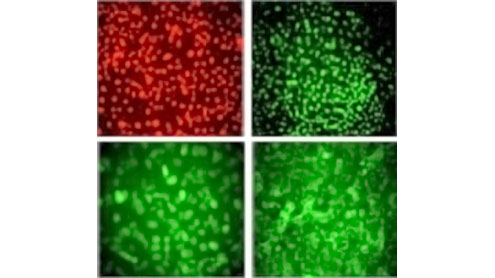 UK scientists took stem cells made from the skin cells of patients with an inherited liver disease called alpha1-antitrypsin deficiency, used “molecular scissors” to effect a “clean” repair of the gene mutation that causes the disease, and showed, both in test tubes and in mice, that the gene worked correctly when the stem cells made new cells that were almost like liver cells.
UK scientists took stem cells made from the skin cells of patients with an inherited liver disease called alpha1-antitrypsin deficiency, used “molecular scissors” to effect a “clean” repair of the gene mutation that causes the disease, and showed, both in test tubes and in mice, that the gene worked correctly when the stem cells made new cells that were almost like liver cells.
Nature reports the study, led by researchers from the Wellcome Trust Sanger Institute and the University of Cambridge, in its 12 October online issue.The study is significant because it uses a tidy method that leaves no remnants of the repair mechanism behind, which could otherwise introduce unacceptable risks in a clinical setting: thus it is a new way of making a “clean correction” to the defect gene.Because of this, it brings closer the possibility of patient-specific stem cell therapies, whereby corrected stem cells are used to grow working liver cells inside the patient and thus avoid the need for expensive and often risky liver transplants.Co-author Professor Allan Bradley, Director Emeritus of the Wellcome Trust Sanger Institute, told the press:
“We have developed new systems to target genes and integrated all the components to correct, efficiently, defects in patient cells.””Our systems leave behind no trace of the genetic manipulation, save for the gene correction,” he added.Co-author Professor David Lomas, Professor of Respiratory Biology at the University of Cambridge and Consultant Physician at Addenbrooke’s and Papworth Hospitals, has spent the last 20 years working on the mechanism of alpha1-antitrypsin deficiency and cares for patients with the condition. He said:
“As there is currently no cure for this disease other than liver transplantation, and given the increasing strains being placed on the national liver transplant programme as a result of the sharp increase in the frequency of liver disease, alternative therapies for genetic and other liver diseases are urgently being sought.”Bradley, Lomas and colleagues targeted a gene defect that causes cirrhotic liver disease and increases the risk of lung cancer and emphysema. The defect results in alpha1-antitrypsin deficiency (A1ATD), the most common known inherited disorder of the liver and lung, occurring in about one in 2000 people of North European origin.
The defect that causes the disease occurs in a single nucleotide change in the gene that codes for alpha1-antitrypsin (A1AT), an enzyme inhibitor that normally protects bodily tissues against excessive inflammation. People with the defective gene cannot release A1AT properly from the liver, where it stays trapped, and causes the damage that leads to liver cirrhosis and lung emphysema. – Medicalnewstoday












